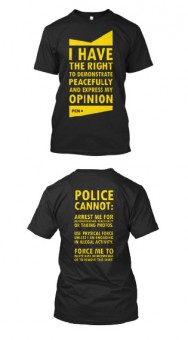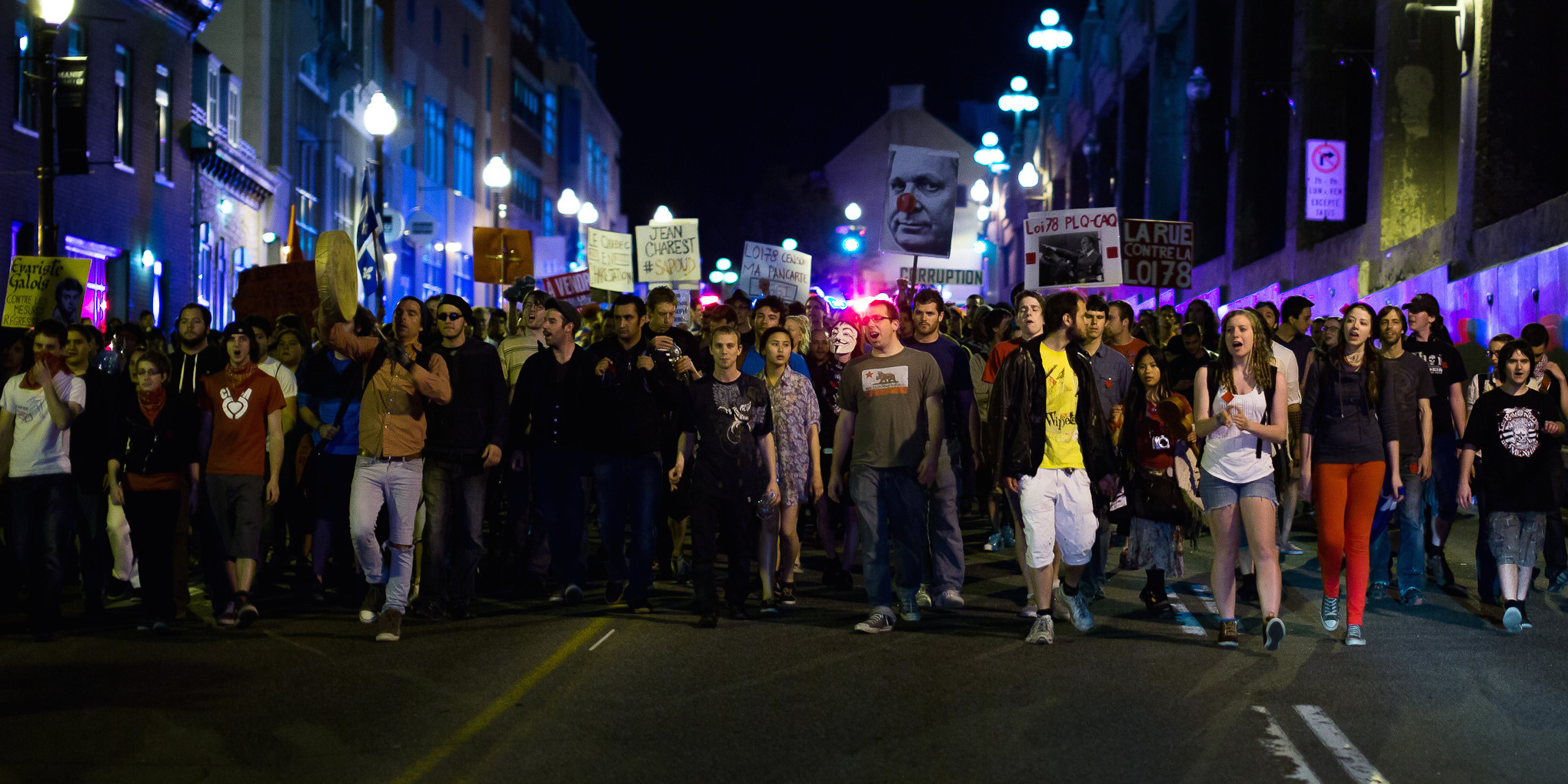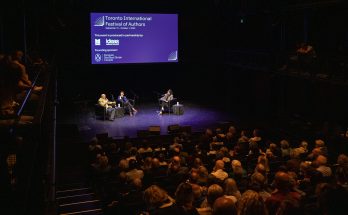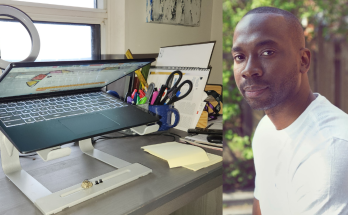This Know Your Rights guide is the third in a series aimed at helping you understand your legal rights to free expression and privacy. The Know Your Rights series is partially funded by IFEX and the Law Foundation of British Columbia, and is part of PEN Canada’s Canadian Issues program. A special thank you to Patricia Snell and Stockwoods LLP for their legal and research support on this guide.
For more on how Canadian legislation surrounding protests and demonstrations affects free expression, see Free Expression Matters: Protests and Demonstrations.
A GUIDE TO PROTEST AND DEMONSTRATION IN CANADA
The right to protest is an important part of Canadian democracy and the right to free expression.

The Canadian Charter of Rights and Freedoms guarantees the freedom of expression, freedom of association, and the freedom of peaceful assembly. Throughout our history, protests have been a key way for people to express dissatisfaction or support for important decisions taken by government or other powerful bodies.
Protesting can be risky. Police can use tear-gas, rubber bullets or water cannons to disperse aggressive protesters, and even peaceful protesters could be arrested if they break a law. By becoming familiar with Canadian laws around protest, you can reduce risk and use your right to protest effectively and safely.
This guide is not legal advice, but it can help you understand you right to protest.
Wear your rights on your sleeve. Check out our protest rights t-shirt, available for sale here. If you’d like to print your t-shirt independently, you can find design files here.
Am I allowed to organize or participate in a protest?
Protesting itself is legal, as long as you don’t break any laws while you’re at it. Section 2 of the Canadian Charter of Rights and Freedoms guarantees your right to protest. In some cities and towns you are required to have a permit to protest. Check your municipal by-laws if you are thinking of organizing a protest.
What could I be arrested for?
You can be arrested for breaking any law at a protest, but some of the more common ones are below.
Protestors are often arrested for:
- Causing a disturbance – this can include loud fighting, shouting, swearing, chanting, or singing in a public place, as well as annoying or getting in the way of other people in a public place. Causing a disturbance can be punished with six months in prison or a $5,000 fine.
- Common nuisance – this includes stopping people from exercising/enjoying their rights or endangering the lives, safety or health of the public. Common nuisance can be punished by up to two years in prison.
- Mischief – this includes destroying or damaging any kind of property. Mischief includes making property dangerous or useless (like smashing windows or slashing tires), making property difficult to use, or getting in the way of any person who wants to use it. Mischief can be punished by a life sentence if you endanger someone’s life. Mischief that damages property the value of which exceeds $5,000 can be punished by up to 10 years in prison or a $5,000 fine.
- Unlawful assembly – this is most common when protests involve violent clashes with police. Unlawful assembly occurs when a group of three or more people give others nearby good reasons to worry that the group will cause a disturbance that includes violence against people or property, or motivate others to cause a disturbance that includes violence. Unlawful assembly can be punished by six months in prison or a $5,000 fine. If you are wearing a disguise, the prison sentence could increase to five years.
- Rioting – this is when a group of three or more people actually do cause a violent disturbance (rather than just making people nearby worry they will). Rioting can be punished by up to two years in prison, but that sentence could increase to 10 years if you are wearing a disguise.
- Conspiracy (to commit one of the offences above) – Even if you personally are not involved in any criminal activity, there is a risk that the police will charge you with “conspiracy to commit …” if you were involved in planning or organizing a protest during which unlawful acts were subsequently committed.
Can police arrest a whole bunch of protesters at once?
Yes, for now. Mass arrests are unusual, but they do happen. Police have many lawful techniques that they can use to manage a crowd of people. For example, the police may form a line of officers and then direct or “filter” protesters out of a particular area. This is usually done to keep busy areas from becoming “hot” or unsafe. You must follow all directions from police to filter out of an area or you risk arrest. You must assume that the officers are directing you because they have information that you do not have. Challenging officers in these circumstances will likely result in lawful arrest.
If the police contain protesters and then provide no filter or exit route, this is known as “kettling”. In a kettling situation, whether your arrest is lawful will depend largely on what directions you were given prior to being contained. You will likely not know why the officers have been ordered to detain you (or your group) but you are entitled to be informed of the reason for your arrest.
If you are kettled, you will likely be held for quite some time before release and you should use that time to keep track of the following:
- The time of your detention (e. the time you were filtered with no route of egress);
- The particulars of any announcements made to the crowd prior to containment. You should always keep track of the time any police announcements are made and how they are made (e. by bullhorn or by individual officers throughout the crowd);
- What options, if any, the directing officers gave you to clear the area prior to being kettled (e. were you advised of another route you could take and, to the best of your knowledge, was that route actually available to you);
- The details of any discussions you have with any officers involved in your arrest including their names, badge numbers, unit details and police service particulars;
- All details pertaining to the reason provided for your arrest including the alleged offence;
- The time and particulars of any requests you make to leave the area after being kettled;
- Whether any other individuals are permitted to leave the area after being kettled;
- Approximately how many other individuals have been kettled with you and, if feasible, the identities of those individuals;
- The time that you are processed by an arresting officer (e. how long were you detained in the kettle before being placed on prisoner transport and/or providing confirmation of your identity to an individual arresting officer); and
- The overall duration of your arrest from the time of detention to release.
Can I photograph or record a police officer while participating in a protest?
Yes. You have the right to photograph, video, or otherwise record police officers who are on duty. Officers do not have the right to ask you delete your photos, or to take away your equipment. It might be a good idea to record the name and badge number of any officers you interact with at a protest.
This guide on your right to photograph goes into more detail on public photography.
What are my rights if I am arrested?
You have the right to know why and to be released if there isn’t a reason. You have the right to talk with a lawyer in private as soon as possible, but police don’t have to let you contact a family member or friend. It’s a good idea to write the number of a lawyer you know who will help you on your body in permanent marker.
In order to arrest you, a police officer must either see you break a law, have good reasons to believe you have broken one, or have good reasons to believe you are about to break one. While the officer arresting you could be mistaken, if you resist arrest, you will be breaking a law and can be charged with a criminal offence on that basis alone. Make sure you photograph or write down anything that could prove that the officer was mistaken so that you can use it in court.
If you are under the age of 18, you also have the right to be accompanied by a parent/guardian or lawyer if the police ask you questions or want you to give a statement.
Where am I allowed to protest?
You can protest on any public property as long as the protest is deemed peaceful. Public property is any space owned by the government. This includes parks, town squares and government buildings. There is an exception for transportation routes (see below).
On private property, but you could be asked to leave. Private property is owned by one or more individuals, like a business or home. If the owner asks you to leave you can move to public space surrounding the property, but police may ask you to leave if you disturb activity on the private property.
Some places, like schools or malls, may seem like public property but are owned by individuals. It’s a good idea to research who owns the place(s) where you want to gather before you stage a protest.
Am I allowed to block a transportation route?
Yes, but not a highway because that is against the law (Criminal Code, Section 423 (1)). Some routes don’t seem like highways, but are. Research your route before you hit the streets.
Other routes are allowed, as long as you can prove you’re not trying to or are likely to cause death or physical harm. Protesters on non-highway roads can only be held accountable for endangering other people if they meant to, but it’s hard to prove in court what you meant to do. Ask yourself, could a person reasonably argue that you meant to hurt others?
Do I have to show the police my identification?
Only if the police tell you that you have broken a law or are suspected of breaking a law. If that is the case, you could be charged with obstruction if you do not identify yourself. Some cities have local laws that allow police to check your identification in a public place. Make sure you know the laws of your city before you protest.
If you are driving a motor vehicle you are always required to show your driver’s license, registration and insurance whenever asked by police. Your passengers do not have to identify themselves unless the police tell them they have broken a law or are suspected of breaking a law.
Can I wear a mask if I am participating in a protest?
Yes, but only if no one at the protest breaks any laws. During the 2012 Quebec Student Protests and the 2010 G-20 protests in Toronto many protesters wore scarves or masks to cover their faces. In response, the Canadian government passed Bill C-309, which makes it illegal to wear a mask or disguise during an unlawful assembly, with a punishment of up to 5 years in prison. If you wear a mask during a riot, the punishment is up to 10 years in prison.
Remember, a peaceful protest can turn into an unlawful assembly if any of the protesters make people afraid that they will become violent. If you must cover your face, be careful to monitor your protest for signs of violence. You should also think about what might qualify as a “mask or other disguise.” Religious coverings, costumes, face paint could all be interpreted as a disguise.
Do I have to speak to the police if they question me?
No, If you don’t want to answer questions, politely ask the officer “Am I free to go?” or “Am I being detained?”. If you are not free to go, you have the right to remain silent, to know why you aren’t free to go (are you being arrested? why?) and to talk with a lawyer. If the officer does not tell you that you are being arrested and also tell you why, you have the right to be released.
Can police search me?
Under Canadian law, a warrantless search is presumptively unconstitutional under s. 8 of the Charter. However, there are a number of exceptions to that general rule, which may be triggered by facts of which you are completely unaware.
The best rule is to use “good judgment” when confronted by a police officer demanding that you identify yourself and/or asking to search your belongings. If you refuse a police officer’s request to search your belongings, you might be right in law, but still face the immediate prospect of detention and arrest (leaving it to your lawyer to argue later on that the arrest and search were unlawful).
During the 2010 G20 protests in Toronto there was a lot of media attention surrounding the Public Works Protection Act (“PWPA”). Contrary to what many believed at the time, the PWPA was not a special law created for the G20, but was actually a well-established wartime statute created to prevent unidentified saboteurs from accessing and damaging critical infrastructure such as power plants or other “public works”. Under the PWPA, if an area were designated as a “public work”, any individual attempting to enter that area would have to identify himself or herself and could be searched. The Ontario Government designated the G20 interdiction zone as a “public work” leading up to the G20 and the police used this as the basis to search individuals attempting to approach the security fence that surrounded the area
The PWPA is no longer in force but you must still be mindful of the area in which you are protesting if police approach you and ask for identification or to search your belongings.
If you are demonstrating in an area that could be the subject of a viable threat (for example a nuclear power plant, courthouse or high security government building), the police might have a legitimate basis to ask you to identify yourself or to search your belongings. You are entitled to ask questions before deciding whether to consent. If a police officer is unable to articulate any reasonable basis to search you, there is likely no lawful basis for that search.
Can protesting affect my future?
Possibly. If you are arrested at a protest and convicted of a criminal offence, you will have a criminal record. This can affect your employment prospects as well as your ability to travel, get insurance and rent housing. Even if the charges are dropped or dismissed, the incident may still show up on a Criminal Record Check. Employers are not allowed to discriminate against you for dropped charges, but Criminal Record Check reports can be difficult to understand and employers may get confused.
Further, there are reports that the federal government has been keeping track of groups and individuals who have been involved in protests, including environmental and indigenous rights groups. Some of their reports include information collected from social media posts and other online activities. While social media can be a useful tool to organize protests, it’s a good idea to keep your protest activities offline if you are concerned about surveillance.
How does Bill C-51 affect my right to protest?
With the passing of Bill C-51, the definition of what constitutes a “terrorism offence” has been expanded, but it has been vaguely defined. So, it is difficult to know whether a demonstration or protest could be seen as supporting or advocating terrorism offences, or if you could be personally considered a terrorist if you are demonstrating or protesting. Prior to Bill C-51, the definition of a terrorism offence was based on various international conventions and was defined in the Canadian Criminal Code as any act motivated by personal beliefs (political, religious, etc.) that causes, or risks causing, death or harm to people.
The passing of Bill C-51 also brought into effect the Security of Canada Information Act, which permits government agencies to share information on an individual in order to protect “against activities that undermine the security of Canada”. The Act specifically excludes “advocacy, protest, dissent and artistic expression”, but activity that undermines national security has been vaguely defined, and includes broad categories such as: interference with the Government of Canada; terrorism; interference with critical infrastructure; and an activity that causes serious harm to a person or their property because of that person’s association with Canada.
There have been arguments that parts of Bill C-51 violate Section 2 of the Charter of Rights and Freedoms, but this has not yet been litigated in court.
Photo: Montreal Student Protest, May 2012 c/o Doug Tanner




